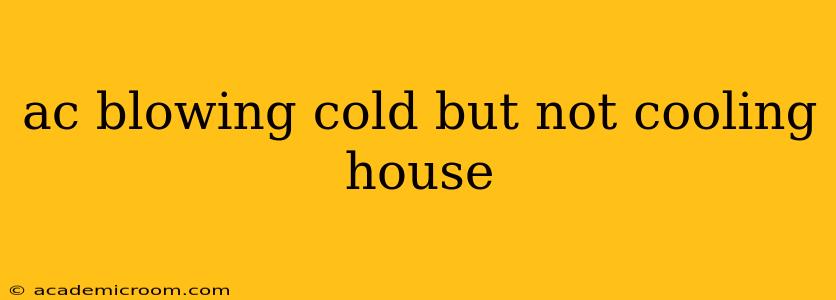Is your air conditioner blowing cold air, but your house isn't cooling down? This frustrating problem can stem from several issues, and diagnosing the root cause is crucial for efficient repair. This comprehensive guide will walk you through the most common culprits, helping you pinpoint the problem and potentially fix it yourself or know what to tell a repair technician.
Why is My AC Blowing Cold Air But Not Cooling My House?
This issue often points to a problem beyond the unit itself. While the air coming out of the vents might be cold, it's not effectively cooling the entire space. Several factors contribute to this:
- Insufficient Airflow: This is the most frequent culprit. Restricted airflow prevents the cold air from properly circulating throughout your home.
- Refrigerant Leaks: A low refrigerant level hampers the cooling process, even if the unit is running.
- Dirty Air Filter: A clogged air filter restricts airflow, reducing the AC's cooling efficiency.
- Frozen Evaporator Coil: Ice buildup on the evaporator coil significantly reduces cooling capacity.
- Ductwork Problems: Leaky or poorly insulated ducts can lead to significant air loss before it reaches your rooms.
- Incorrect Thermostat Settings: A simple oversight, but double-checking your thermostat settings is a crucial first step.
- Oversized AC Unit: A unit too large for your space might cool quickly but then cycle off frequently, preventing consistent cooling.
- Undersized AC Unit: A unit too small struggles to adequately cool the house, even if blowing cold air.
How Can I Fix My AC Blowing Cold Air But Not Cooling the House?
Let's delve into each potential problem and how to address it:
1. Insufficient Airflow: Where's the Cold Air Going?
- Check the Air Filter: The most common and easiest fix! A dirty air filter drastically reduces airflow. Replace it with a new one.
- Inspect Vents: Make sure all vents are open and unobstructed. Furniture, rugs, or curtains blocking vents significantly impact airflow.
- Check for Blockages in Ductwork: This requires more investigation. Look for any obstructions in the ductwork that may be impeding airflow within the walls. This is best left to professionals if you're unsure.
2. Refrigerant Leaks: A Silent Thief of Cool Air
Refrigerant leaks are serious and require professional attention. Low refrigerant levels prevent efficient cooling, even if the system is operating. You'll likely need a qualified HVAC technician to identify and repair the leak and recharge the system. Do not attempt this repair yourself.
3. Frozen Evaporator Coil: A Cold Case
A frozen evaporator coil significantly impairs cooling. This often results from restricted airflow (see point 1 above) or low refrigerant levels. Again, professional help is usually required to diagnose and fix this problem.
4. Ductwork Problems: Hidden Leaks & Inefficiencies
Leaky or poorly insulated ductwork is a common cause of inadequate cooling. Air escapes before reaching the living spaces, rendering the AC less effective. Finding these leaks requires a thorough inspection, often involving specialized equipment. This is best left to a professional HVAC technician.
5. Incorrect Thermostat Settings: Simple Fixes, Big Impact
- Check the Fan Setting: Ensure the fan is set to "Auto" and not "On." The "On" setting keeps the fan running constantly, potentially not aligning with the compressor's cooling cycles.
- Verify the Temperature Setting: Double-check that the thermostat is set to the desired temperature and that it's operating correctly. Consider replacing the batteries if necessary.
- Programmable Thermostats: If using a programmable thermostat, ensure the settings are correctly programmed to your needs.
6. Oversized or Undersized AC Unit: A Sizing Mismatch
An improperly sized AC unit is a common reason for inconsistent cooling. An oversized unit cycles on and off too quickly, preventing consistent cooling. An undersized unit struggles to keep up, leading to insufficient cooling despite blowing cold air. Consult with an HVAC professional to determine the correct size for your home.
When to Call an HVAC Professional
While some troubleshooting steps can be done independently, certain issues require professional expertise. Contact an HVAC technician if:
- You suspect a refrigerant leak.
- Your evaporator coil is frozen.
- You suspect problems with your ductwork.
- Your AC unit is old and inefficient.
- You're unsure about the cause of the problem.
Addressing the issue promptly prevents further damage and ensures efficient, comfortable cooling in your home. Remember, safety is paramount. If you're uncomfortable performing any of these checks, call a qualified technician.
